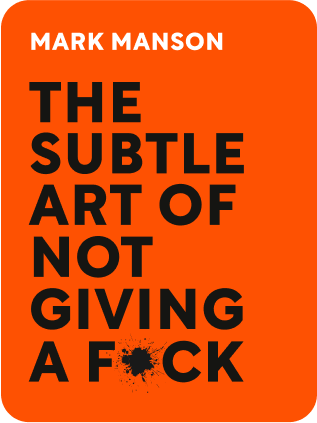

This article is an excerpt from the Shortform book guide to "The Subtle Art of Not Giving a F*ck" by Mark Manson. Shortform has the world's best summaries and analyses of books you should be reading.
Like this article? Sign up for a free trial here .
Why do so many people today fall into the entitlement trap? And Why is entitlement such a big problem?
The entitlement trap takes two forms: you feel like you’re entitled to be happy all the time, or you think you’re special or different in some way. The truth is: it’s impossible to feel good all the time, and most of your problems are not unique or exceptional.
Keep reading to learn why you are not special, and that’s okay.
The Entitlement Trap
Manson says that a feeling of entitlement is rampant today because many people have bought into cultural and social media messages about what it takes to be happy—which actually makes them more miserable and unable to cope with challenges in life.
According to Manson, entitlement can take one of two forms:
1. You believe that you’re entitled to feel good all the time.
(Shortform note: This type of entitlement is the result of letting your emotions manage you, rather than managing your emotions. Recall the emotional intelligence model from Chapter 2—controlling your emotions to achieve your goals is a large part of emotional intelligence.)
2. You believe that you’re exceptional or different. There are two ways that this belief can express itself:
- You feel different in a self-aggrandizing way, like believing that you’re always the smartest person in the room.
- You feel different in a negative way, often as a response to trauma. You may think that you’ve suffered more than anyone else has, so you deserve pity; or you may believe that you’re damaged beyond repair and there’s no point in trying to improve yourself.
| You Are Not Special—And That’s a Good Thing Therapist Lori Gottlieb’s memoir Maybe You Should Talk to Someone discusses the fact that sometimes, a person who’s going through difficulty in life can’t move past it until they stop seeing their problems as unique or exceptional. In one example that she relates to illustrate this, a woman with a history of alcoholism (prompted by an abusive marriage) is unable to forgive herself for her past mistakes—she feels like she has messed up her life in a unique way and that her mistakes are worse than other people’s. She’s therefore unable to get involved in a new (healthier) romantic relationship. She can only move forward when she accepts that her struggles are similar to millions of other people’s struggles. Another of Gottlieb’s examples shows the opposite type of exceptionalism: A man who thinks he’s smarter than everyone around him continually causes problems in his relationships until he accepts that he isn’t special, either. These examples show that feelings of exceptionalism can work in both ways—they can hold people to pain that they think is special, or they can hold people to feelings of superiority that prevent meaningful relationships. It’s only when a person recognizes that they’re not exceptional (and that that’s okay), that they can make progress in treatment and in their lives. |
How Entitlement Started
Manson connects our current entitlement epidemic to a trend that began in the 1960s, when the self-esteem/exceptionalism philosophy spread through schools, churches and business development seminars. The focus became feeling good about yourself, rather than trying, failing, learning, and accomplishing things.
In the sixties, researchers concluded that people who felt good about themselves tended to perform better and caused fewer problems for society. Psychologists and policymakers began promoting self-esteem in the hope it would lead to such things as better academic performance, less crime, greater employment and job performance. Over the next decade, self-esteem approaches were adopted by teachers, parents, policymakers, and therapists, and were integrated by schools.
| Can You Have Too Much Self-Esteem? The late Dr. Nathaniel Branden is often credited as the founder of the self-esteem movement of the 60s. He defined self-esteem as both confidence that you can handle life’s challenges, and a belief that you deserve to be happy. Furthermore, Branden argued that a lack of self-esteem led to various neuroses—in other words, that people suffered from mental disorders because they didn’t believe that they were competent, or didn’t believe that they deserved to be happy. Branden neatly summarized his ideas in his 1984 essay In Defense of Self: “I cannot think of a single psychological problem—from anxiety and depression, to fear of intimacy or of success, to alcohol or drug abuse, to spouse battering or child molestation, to suicide and crimes of violence—that is not traceable to the problem of a poor self-concept.” However, others say that too much self-esteem causes those very problems. For example, in Ego Is the Enemy, author Ryan Holiday says that having too much pride in your own abilities and too high a self-image can lead to issues like anxiety and depression: You’ll be anxious about taking on any challenge that you might not succeed at because failure would be a blow to your pride; and you could become depressed if you do fail at something, because you haven’t lived up to the impossible standards you set for yourself. |
Manson believes that the self-esteem movement had major negative impacts on society. It led to such things as grade inflation and participation awards. Business and motivational speakers told people that everyone could be successful. Church leaders taught that their members were special in God’s eyes and destined for greatness.
As a result of that movement, Manson says, we now feel entitled to success, regardless of whether we’ve earned it.
| Participation Trophies: Pros and Cons Participation trophies, which promote the idea that everyone is a winner, are still hotly debated by coaches, parents, and psychologists alike. There are compelling arguments on both sides of the issue. Some say that participation trophies are good because they reward children’s efforts (regardless of the outcome). Those in favor of participation trophies say that such awards teach children that it’s good to try new things, to do their best, and to be part of a team—all valuable lessons, regardless of whether they won or lost any particular contest. However, some say that participation trophies are bad because the above reasoning backfires. Those against participation trophies say that, rather than rewarding children for doing their best, they teach children that everyone gets the same prize no matter who wins (and, therefore, there’s no reason to do their best). So far, neither coaches nor psychologists have reached a consensus on the issue, but Manson clearly falls into this second category; he believes that trophies should only be given to those who earn them by winning a contest. |
Why Entitlement Is a Problem
Manson believes that entitlement is a problem because:
- It keeps you from growing and learning. We need to experience and learn from failure and challenges if we are to become successful adults. When you feel entitled, you skip this step.
(Shortform note: Studies have shown that “gifted” children, who were often praised for their natural abilities rather than their efforts, tend to grow into adults who avoid struggles and failures. They tend to take failure as a sign that they’re not “good” at whatever they were trying to do, rather than a sign that they need to put in more work to get the results they want. In other words, they feel entitled to skip that work because of their natural gifts.)
- You feel entitled to rewards you didn’t earn, and you convince yourself you’re doing great things when you’re not.
| In The Happiness Hypothesis, Jonathan Haidt observes that we overestimate our own contributions to a project or a relationship and underestimate other peoples’ contributions. This overly positive view leads to entitlement, and causes relationship friction because we overstate our value to the group. For example, Haidt cites a 1979 study that asked husbands and wives how much they personally contributed to household work. Their answers added up to 120%, an impossible number that showed they were overvaluing their own work. |
- At the extreme, entitled people are self-aggrandizing—if something good happens to them they believe it’s because they’re great; if something bad happens then it’s not their fault. They do whatever they feel is necessary to maintain their self-image and status, including abusing others.
(Shortform note: The qualities Manson describes here are also traits of narcissism. At the extreme, narcissism can take the form of Narcissistic Personality Disorder, which is characterized by extreme preoccupation with self-image, a lack of empathy, and the inability to own up to one’s mistakes. Notably, psychologists don’t believe narcissism stems from an abundance of self-esteem, but rather, from an obsession with attention, admiration, and status. This reflects a potentially negative consequence of giving too many f*cks about expectations driven by social media, as Manson warns against.)
The real gauge of a person’s self-esteem is how they feel about their flaws and bad experiences, not how they feel about their positive experiences.
Manson says that if you have genuine self-esteem, then you recognize your flaws and work to fix them. If you have a fragile self-esteem that comes from entitlement, then you do everything you can to hide your flaws (even from yourself) and deny that they exist.
(Shortform note: Scientific studies have shown that Manson is correct: There is a strong link between narcissism and insecurity—in other words, a lack of true self-esteem. As a side note, the same study also attempted to show a link between insecurity and psychopathy (a condition similar to narcissism, characterized by lack of empathy and amoral behavior), but was unable to prove that such a link existed.)
Trauma May Lead to Entitlement
Manson notes that another factor that can lead to a feeling of entitlement is having experienced trauma in your life. This kind of entitlement stems from either the belief that you’re terrible and everyone else is great, or that you’re great and everyone else is terrible. Either way, you feel unique and deserving of special treatment. You may even alternate between these feelings, up one day and down the next.
It develops this way:
- You experience trauma.
- You feel helpless to solve your problems.
- You feel there is something wrong with you.
- You feel your problems are unique and therefore you’re different from others. You feel that different rules must apply to you; that you’re entitled to special attention or treatment.
- You may overcompensate to prove your value and worth, through such things as unhealthy relationships, drinking, sex, and trampling others’ feelings. You may feel entitled to do and say whatever you want, then use your trauma to justify your actions.
| Learned Helplessness What Manson describes here is what psychologists call learned helplessness. When someone goes through trauma and feels helpless to change the situation or protect him- or herself, that person might conclude that it’s impossible to change any stressful or traumatic situation. Someone suffering from learned helplessness will become passive in stressful situations, and will simply let traumatic things happen to them. This feeling of helplessness creates a great deal of stress. Amy Duckworth discusses the devastating effects that learned helplessness can have on a person’s motivation and thus their ultimate success in her book Grit. She references several studies showing that when a person (or an animal) is forced to endure traumatic experiences that they have no ability to stop, they react submissively to future trauma as well. This effect can last their entire lives, especially if the initial trauma they endured was during childhood. They essentially learn to give up, which makes it less likely they’ll successfully navigate challenges towards their goals. Learned helplessness is also associated with several mental health conditions, including depression and PTSD. The unhealthy relationships, addiction issues, and selfish behavior that Manson describes in the final bullet point are common coping mechanisms for people with those conditions. |
Exceptional Is Not the Norm
Technology has solved many problems. However, Manson believes that it’s given us new mental problems by flooding us with huge amounts of biased information, which convinces us that the exceptional is actually normal. That leaves a lot of average people feeling inadequate and insecure, with a distorted view of themselves.
We’ve come to believe that being average is being a failure; but if everyone were considered extraordinary, then no one would stand out.
| Averageness as Failure in The IncrediblesWe can see how prevalent this belief is by observing how it’s made its way into many pop culture references. For example, the premise of The Incredibles, a superhero movie by Pixar, is based on this idea: The villain (Syndrome) has a plan to destroy the very concept of superheroes by granting everybody superpowers because, in his own words, “…when everyone’s super, no one will be.” His plan rests upon the idea that being average is failing—that if the superheroes aren’t exceptionally powerful, then they aren’t superheroes at all. It’s also noteworthy that, when Syndrome reveals his grand plan, none of the heroes even question its premise. What might have been a philosophical debate was instead presented as a simple statement of fact. No debate was needed, because society (in other words, the audience) already believes that Syndrome is right, and that his plan will succeed unless the heroes stop him (which, of course, they do). In doing so, The Incredibles promotes the very exceptionalism that Manson argues against. |
It’s Okay to Be Average
In fact, Manson bluntly tells us, you are probably average at most things that you do. If you excel at something, you’re still probably average or worse at other things.
To be emotionally healthy you need to accept that:
- You are not special or extraordinary.
- What you do doesn’t matter that much, all things considered.
- Much of your life will be unexciting and dull.
(Shortform note: Manson has since elaborated on these points. In his blog post “In Defense of Being Average,” he clarifies that we should never try to be average; however, we should accept it when we end up average in spite of our best efforts. In other words, he doesn’t recommend aiming for mediocrity, but rather, accepting that we’ll most likely blend in with the crowd.)
According to Manson, accepting these realities eliminates the pressure and stress of feeling inadequate and always needing to compensate. You can do and achieve what you want, free of unrealistic expectations.
When you lower your expectations to a realistic level, you’ll have a greater appreciation for ordinary things like spending time with friends, helping someone, or pursuing something you enjoy. These are actually the important things.
| A popular way of explaining this idea is with the “equation” happiness = reality – expectations. The equation implies that if your reality doesn’t live up to your expectations, then your happiness is negative—in other words, you’re unhappy. Thus, according to this “formula,” the simplest way to become happier is to lower your expectations. Following this line of thought to its logical conclusion, if your expectations = 0 (that is, if you have no expectations at all) then you’ll be happy with whatever reality you have. That’s one way to approach what Tara Brach calls Radical Acceptance—not expecting or anticipating anything, but simply accepting each moment as it comes. |

———End of Preview———
Like what you just read? Read the rest of the world's best book summary and analysis of Mark Manson's "The Subtle Art of Not Giving a F*ck" at Shortform .
Here's what you'll find in our full The Subtle Art of Not Giving a F*ck summary :
- How to clarify what's important to you (and not just what you think should be important)
- Why it's okay for things to not always go well in life
- Why you need to care about fewer things






